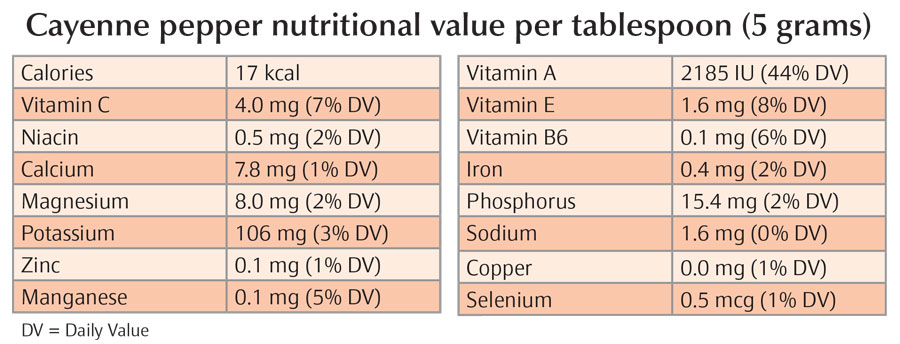 Ready to heat things up in the kitchen (and fire up your health)?
Ready to heat things up in the kitchen (and fire up your health)?
Chili peppers, bell peppers, jalapenos, habaneros, cayenne chillies, pimiento… These are the many names for some fruits of the Capsicum annuum species of plants. Yes, these are botanically fruits, but most often referred to as vegetables.
Before we get to some healthy capsicum recipes and capsicum curry, a little lesson on capsicums. All capsicums are green when they’re young, changing to red and orange as they mature. All capsicums are edible (although the seeds can be bitter) and more mature capsicums are sweeter. Paprika, for example, is made from ground dried capsicum.
Advertisement
But one of the most popular spices readily available with capsicum health benefits is the mighty cayenne pepper. Buy it dried or slice it fresh and add to soups and stews or sprinkle on grilled vegetables, fish and pork chops.
The spiciness level of a pepper is expressed in Scoville heat units (SHU), a measure of the active ingredient capsaicin in the pepper – recognized as “heat” by the palate. The heat range of individual peppers will vary because it is affected by the variety and growing conditions. Capsicums are available all year round but are most abundant during the summer months.
Why does capsicum have health benefits?
 What gives the chili its spiciness is the capsaicin, the potent compound which is commonly used for the treatment of aches and pains of the muscles and joints. It’s a popular active ingredient in topical creams and gels for this purpose.
What gives the chili its spiciness is the capsaicin, the potent compound which is commonly used for the treatment of aches and pains of the muscles and joints. It’s a popular active ingredient in topical creams and gels for this purpose.
Cayenne is rich in capsaicin, and also contains vitamins C, B6, and E, potassium, manganese, and flavonoids for protective antioxidant properties. So there’s a lot going on when it comes to capsicum nutritional facts. See the chart below.
Capsicum: Nutritional chart

Capsicum: Top health benefits
 We’ve covered capsicum nutritional facts, so now let’s take a look at capsicum health benefits:
We’ve covered capsicum nutritional facts, so now let’s take a look at capsicum health benefits:
Pain relief. Capsaicin, its active ingredient, has powerful pain-relieving properties when it’s applied to the skin. As the University of Maryland Medical Center reports, capsaicin reduces the amount of substance P – a chemical that carries pain messages to the brain – in your body. When there is less substance P, the pain messages no longer reach the brain, and you feel relief.
Capsaicin is often recommended for the following:
- Osteoarthritis and rheumatoid arthritis, as well as joint or muscle pain from fibromyalgia or other causes.
- Nerve pain from shingles and other painful skin conditions that happens even after the skin blisters have healed. The research is mixed on this one, so it may work for some and not others. However, don’t apply capsaicin cream to cracked skin or open wounds.
- Pain after surgery, such as a mastectomy or an amputation.
- Pain from nerve damage in the feet or legs from diabetes, called diabetic peripheral neuropathy.
- Low back pain, according to several studies.
Weight loss. Some studies suggest that mixing cayenne pepper with your food boosts calorie burn, in turn helping with weight loss. Researchers at Purdue University conducted a study that evaluated the effects of red pepper doses on thermogenesis, a term for creating heat in the body that revs metabolism and the ability to burn fat.
The findings of their study, published in the journal Physiology & Behavior, suggest that consuming just half a teaspoon of cayenne pepper along with a meal can help burn additional calories four hours after eating.
Psoriasis. This long-lasting skin disease usually appears as patches of raised red skin covered by a flaky white buildup. Capsaicin cream is popular for reducing itching and inflammation.
Circulatory problems. Capsaicin is being investigated for treating circulatory problems, such as heart disease from atherosclerosis or plaque blocking the arteries to the heart, and reducing risk of an irregular heart rhythm. In traditional Chinese and Ayurvedic medicine, the chili has long been used to help treat circulatory problems and increase appetite.
Ear infections. In extremely diluted homeopathic formulations, capsaicin may help treat ear infections.
Cluster headaches. A study published in Cephalalgia found that topical application of capsaicin can desensitize sensory neurons by depleting the nerve terminals of substance P in the brain that we talked about earlier. This is a welcome natural option for headache pain relief.
Fast tips: Always wash your hands straight after using cayenne and avoid touching your eyes. And check with your doctor beforehand because some medications should not be mixed with capsaicin.
Capsicum recipes for health
With the many capsicum health benefit, why not try spicing things up in your kitchen with these healthy recipes for capsicum curry, rice pilaf and a fresh salad? These are quick and easy to prepare, based on some good finds on allrecipes.com!
Capsicum curry
For a bright Indian chicken curry, heat a bit of olive oil in a skillet over medium heat. Saute a small chopped onion until lightly browned. Stir in some minced garlic (2 or 3 cloves), 3 tbsp of curry powder, 1 tsp of cinnamon, paprika and grated fresh ginger root, and a pinch of salt. Stir for 2 minutes and then add 2 skinless, boneless chicken breasts cut into bite-size pieces along with 1 tbsp tomato paste, 1 cup plain yogurt and ½ cup coconut milk.
Bring to a boil and then reduce heat and simmer for 25 minutes. Stir in 1 tsp cayenne pepper, some fresh lemon juice and simmer an additional 5 minutes. Serve over your favorite rice and enjoy! 4 servings.
Capsicum rice
Try this rice amazing rice pilaf! Heat a large skillet on medium high with 2 tsp of olive oil and add two cups of long grain white rice (uncooked). In a saucepan, heat 4 cups of liquid for your rice, preferably a mix of water and vegetable or chicken stock. In the skillet, add ½ cup chopped onion and ½ cup chopped celery and cook for a few minutes until the onions have softened.
Empty the rice into the saucepan, add ¼ tsp cayenne and a pinch of black pepper. Bring to a simmer and cover and cook according to your rice package directions. Fluff with a fork and stir in some chopped parsley, toasted almonds and heated peas for a little interest. Delicious! 4 servings.
Capsicum salad with raw capsicum
Here’s a great salad for the warmer season. Seed and chop a green, red and yellow bell pepper and a hot chili pepper for some kick. Add a chopped English cucumber and toss in a large bowl with ¼ cup chopped fresh parsley, 8 ounces crumbled feta and 1 tbsp olive oil. Chill in the fridge for half an hour and then add salt and pepper to taste. 4 servings.
Try these capsicum recipes, along with herbal supplements and topical creams, to reap the many capsicum health benefits. The heat is on!
Related Reading:
Advertisement
Most effective anti-inflammatory foods, herbs and spices
Many people confuse inflammation with infection. Though infection and inflammation can happen at the same time, they are completely different. Infection is just one of the causes of inflammation. Read more here.
Natural home remedies for weight loss
You’re not in a happy place if you’re overweight or obese – and neither is your body. In fact, how much you weigh, in relation to your height, your waist size (pinching more than an inch of flab?) and how many pounds you’ve gained since your mid-20s have a huge impact on your health.
Fix aches, pains with natural muscle relaxers
We’ve all experienced muscle pain at one time or another. You know, the kind triggered by muscle strain, nerve compression, injury, not to mention joints that are completely ….Read more
